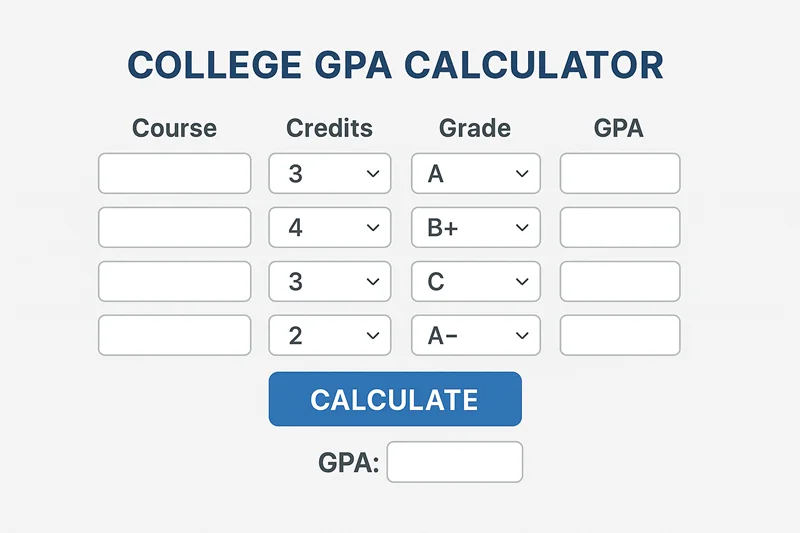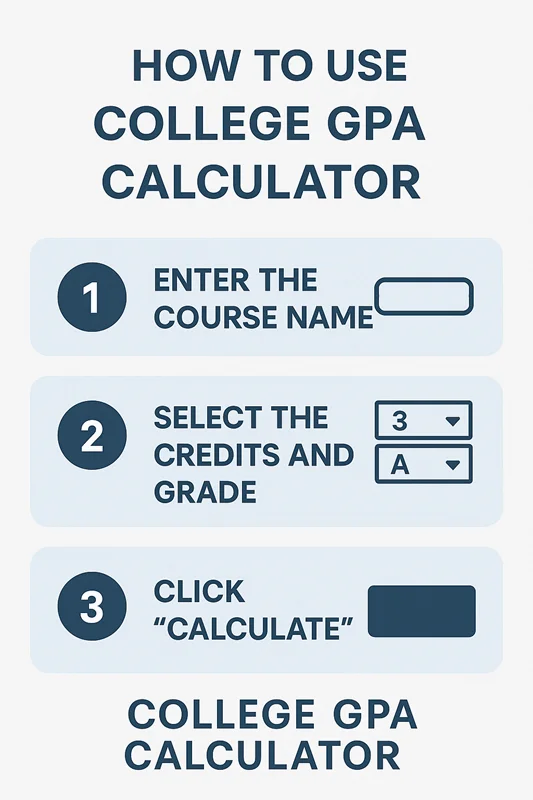Course Information
| Course Name | Grade | Credit Hours | Action |
|---|---|---|---|
Calculate your semester and cumulative GPA with ease
| Course Name | Grade | Credit Hours | Action |
|---|---|---|---|
Managing your college GPA is one of the most important aspects of your academic journey. Whether you’re tracking your semester performance, planning for scholarships, or preparing for graduate school applications, understanding how to calculate and improve your grade point average is essential for every college student.
This comprehensive guide will help you master GPA calculations, understand different grading systems, and make informed decisions about your academic future. From basic GPA formulas to international conversion charts, we’ve got everything you need to stay on top of your academic performance.
A college GPA calculator is a digital tool that automatically computes your grade point average based on your course grades and credit hours. Instead of manually calculating complex formulas, you simply input your course information, and the calculator does the math for you.
These calculators are invaluable for students who want to:
Your grade point average represents the numerical value of your academic performance across all courses. It’s calculated by dividing the total number of grade points earned by the total number of credit hours attempted.
The standard GPA formula is: GPA = Total Grade Points ÷ Total Credit Hours
Semester GPA: Reflects your performance in a single semester Cumulative GPA: Your overall GPA across all completed semesters Major GPA: Calculated using only courses within your major field of study
Most U.S. colleges use the 4.0 GPA scale, where each letter grade corresponds to a specific point value:
Letter Grade | Grade Points | Example Percentage |
A+ | 4.0 | 97-100% |
A | 4.0 | 93-96% |
A- | 3.7 | 90-92% |
B+ | 3.3 | 87-89% |
B | 3.0 | 83-86% |
B- | 2.7 | 80-82% |
C+ | 2.3 | 77-79% |
C | 2.0 | 73-76% |
C- | 1.7 | 70-72% |
D+ | 1.3 | 67-69% |
D | 1.0 | 60-66% |
F | 0.0 | Below 60% |

Let’s walk through a practical GPA calculation example:
Example Semester:
Calculation:
Many Indian universities use a 10-point CGPA system. Here’s how to convert:
CGPA (10-point) | GPA (4.0 scale) |
10.0 | 4.0 |
9.0 | 3.6 |
8.0 | 3.2 |
7.0 | 2.8 |
6.0 | 2.4 |
5.0 | 2.0 |
Quick Conversion Formula: GPA = (CGPA ÷ 10) × 4
Canada: Uses percentage grades and 4.0 scale similar to the U.S. UK: Uses degree classifications (First Class, Upper Second, etc.) Australia: Uses HD (High Distinction), D (Distinction), C (Credit), P (Pass)
Understanding where your GPA stands can help you set realistic academic goals:
GPA Range | Academic Standing | Typical Outcomes |
3.8-4.0 | Summa Cum Laude | Top graduate programs, merit scholarships |
3.5-3.79 | Magna Cum Laude | Most graduate programs, good scholarships |
3.2-3.49 | Cum Laude | Many graduate programs, some scholarships |
3.0-3.19 | Good Standing | Graduate school possible, limited scholarships |
2.5-2.99 | Satisfactory | Focus on improvement needed |
Below 2.5 | Academic Probation | Risk of dismissal, immediate action required |
Most merit-based scholarships have minimum GPA requirements:
Different programs have varying GPA expectations:
Credit hours represent the weight each course carries in your GPA calculation. Understanding this concept is crucial:
Higher credit courses have more impact on your GPA. A poor grade in a 4-credit course will hurt your GPA more than the same grade in a 1-credit course.
Strategic course planning: If you’re struggling in a high-credit course, consider:
Start strong each semester: First impressions matter, and early good grades create momentum.
Focus on high-credit courses: These have the most significant impact on your overall GPA.
Don’t neglect “easy” classes: Every grade counts, and easy A’s can boost your average.
If your GPA needs improvement:

A good college GPA typically falls between 3.0-3.5, with anything above 3.5 considered excellent. However, "good" depends on your goals:
Focus on these immediate strategies:
Scholarship GPA requirements vary widely:
Yes, GPA recovery is possible with consistent effort. Since cumulative GPA includes all semesters, strong performance in later years can significantly improve your overall average. The key is starting your improvement plan as early as possible.
Some high schools and colleges use weighted GPA systems that give extra points for challenging courses like AP, IB, or honors classes. However, most college GPA calculator use unweighted systems where:
When applying to graduate programs or scholarships, verify whether they prefer weighted or unweighted GPAs.
Regular GPA monitoring helps you make informed academic decisions:
Course Selection: Choose a balanced mix of challenging and manageable courses each semester.
Major Declaration: Your GPA in prerequisite courses can indicate your likelihood of success in a particular major.
Career Planning: Some careers and graduate programs have strict GPA requirements that influence your academic path.
Your college GPA is more than just a number—it’s a reflection of your academic dedication and a key factor in your future opportunities. By understanding how to calculate, track, and improve your grade point average, you’re taking control of your educational journey.
Remember that while GPA is important, it’s not the only measure of your college success. Internships, research experience, leadership activities, and personal growth all contribute to your overall college experience and future prospects.
Use GPA calculations as a tool for academic planning and improvement, not as a source of stress. With consistent effort, strategic course planning, and the right resources, you can achieve your academic goals and build a strong foundation for your future career.
Stay proactive about tracking your academic progress, seek help when needed, and remember that every semester is an opportunity to improve. Your dedication to understanding and managing your GPA demonstrates the kind of academic responsibility that will serve you well throughout your college years and beyond.